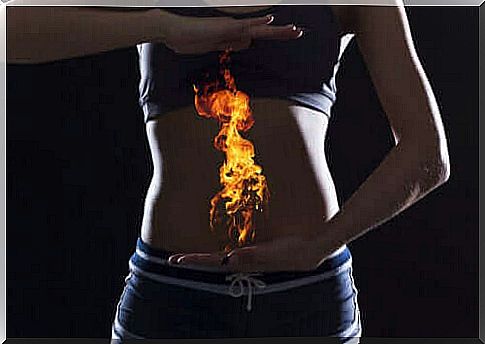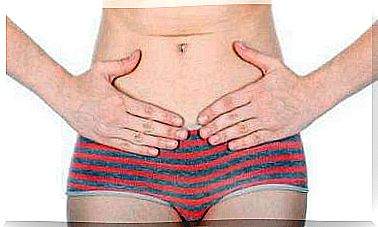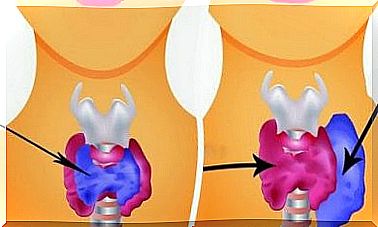What Causes Acid Regurgitation?

Pain or a burning sensation in the upper abdomen is a common symptom among adults. We also call it acid regurgitation. In this article, we will explain what acid reflux is and what causes it.
The burning sensation in your stomach, which can sometimes spread to behind the sternum (the bone that sits in front of the heart), may not always be as bothersome. In any case, one may need to make some changes in one’s lifestyle if one wants to solve the problem.
What are acid reflux?
The stomach is an organ that forms part of the digestive system. It sits in the abdomen in the upper, middle part. Above that we find the esophagus, and below is the small intestine.
The function of the stomach is to help break down food. The acid that it produces is called stomach acid and helps with the digestion of proteins and the uptake of iron, calcium and B12 vitamins.
In addition, stomach acid kills a large part of the microorganisms we ingest and limits the growth of bacteria. It also helps prevent intestinal infections.
If the stomach acid does not continue to the intestines and actually travels back towards the esophagus, we experience gastroesophageal reflux. Here we should state that this reflux is to some extent physiological. These episodes usually occur after eating, are short-lived, do not cause symptoms and rarely occur during sleep.
When reflux does not cause bothersome symptoms or complications, it is known as non-physiological gastroesophageal reflux. It is caused by stomach acid or pyrosis, which is a burning sensation that is felt in the abdominal area or behind the sternum.

How and why do we get acid reflux?
When we eat, food passes from the mouth, through the esophagus and then towards the stomach. In the esophagus and stomach there is a round muscle called the sphincter. It helps keep the contents of the stomach from returning to the mouth.
When the acid content in the stomach for some reason rises again, in addition to what we call physiological reflux, one can experience acid regurgitation or heartburn. The exact reason why we experience acid reflux is still being investigated.
There are various possible theories such as changes in the movement of the digestive tract, the body’s production of acid, our stress levels and diet in addition to the physiological and hereditary factors.
We need to state that we are not talking about defined diagnoses here, such as stomach ulcers, gastroesophageal reflux syndrome, irritable bowel syndrome or gallstones. In each of these situations, however, one can also experience heartburn.
Risk factors and causes of acid reflux
As we have mentioned, specialists continue to study the cause of acid reflux. However, there are elements that we know are “risk factors”. We should go for avoiding these whenever possible to reduce the risk of heartburn.
Diet is one of these factors. It can affect the level of stomach acid in some people, especially when consuming certain products such as foods that are strong, rich in fat or citrus, produced from tomato (such as ketchup), mint, chocolate, carbonated beverages and alcohol.
Being overweight is another factor that can increase the risk of suffering from acid reflux. During pregnancy, it is common to experience it for a similar reason, as the uterus expands and presses against the abdomen, causing reflux due to changes in the anatomy.
When should you go to the doctor?
Some cases require additional testing if it is suspected that heartburn is caused by something specific. In these situations, it is always best to go to a specialist to determine what they may be.
It is important to note that it would be a cause for concern if a patient over the age of 60 develops acid regurgitation and they have not experienced it before. It is even more alarming if the patient also experiences bleeding in the gastrointestinal tract (it is characterized by finding blood in the stool or vomit).
Another disturbing factor is having a lack of appetite as well as an unexplained weight loss or difficulty swallowing. Sometimes the patient may also experience chest pain that is not related to cardiovascular problems but comes from the digestive system.
If there is a history of cancer in the person’s close family, if their parents, uncles, aunts or grandparents have had any form of cancer, it is also important to be more aware if there are symptoms that suggest they are experiencing acid regurgitation. , and go to a specialist pretty quickly.

What to do if you suffer from heartburn?
For those who experience heartburn in the abdomen or sternum, mild or sporadic, there are some things that can help. Here are some steps that would be beneficial to follow as they can help improve the symptoms.
- To lose weight in cases where the affected person is overweight.
- Raise the headboard on the bed: This can be done by placing pieces of wood under two of the legs of the bed or a wedge under the bed. Do not use too many pillows as it can cause neck pain.
- Avoid certain foods that aggravate the symptoms: These include coffee, chocolate, alcohol, mint, or foods that are fatty, strong, or spicy.
- Quit smoking: Tobacco is a cause of heartburn.
- Avoid eating too late: Going to bed with a full stomach can aggravate reflux. We should try to eat at least two to three hours before going to bed.
Specialists recommend that we do not use over-the-counter antacids. It is always best to go to a professional regarding complications like this. If one’s symptoms become more intense, appear at night or last for a long time, we recommend that one goes to a professional as soon as possible.









